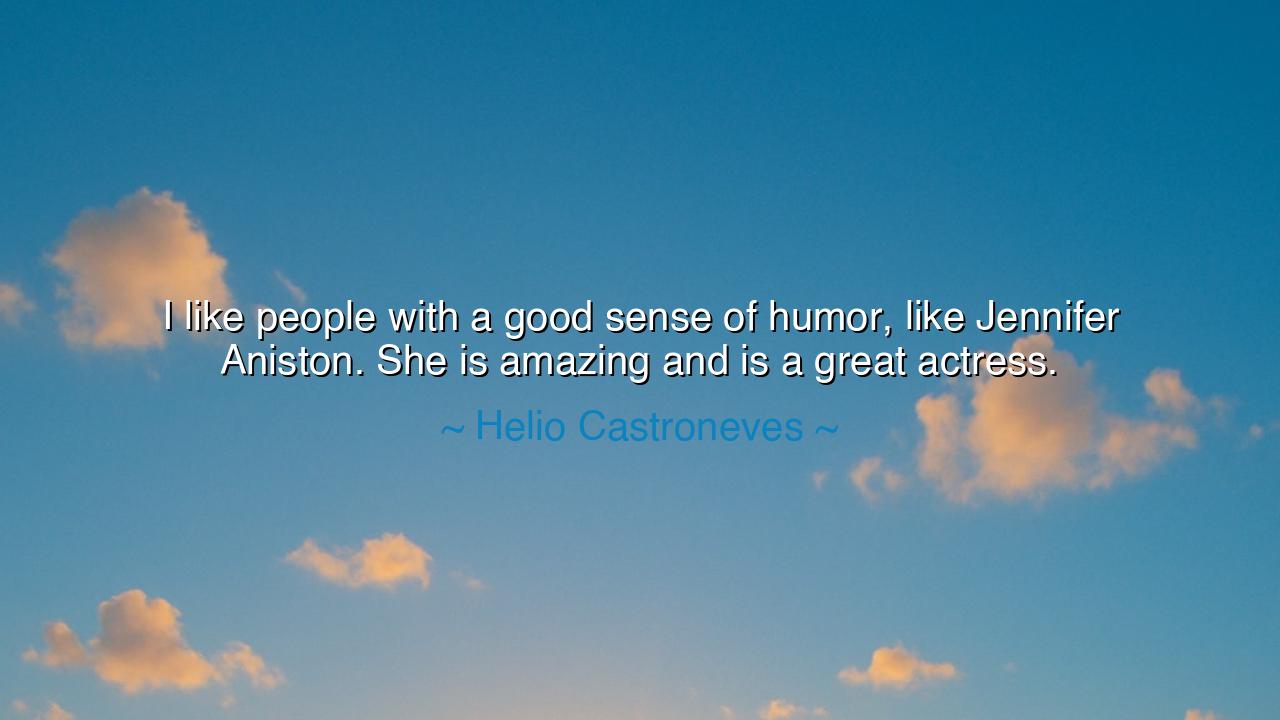
I like people with a good sense of humor, like Jennifer Aniston.
I like people with a good sense of humor, like Jennifer Aniston. She is amazing and is a great actress.






Hear the words of Helio Castroneves, the racer who conquered both track and time, who said: “I like people with a good sense of humor, like Jennifer Aniston. She is amazing and is a great actress.” Though spoken in simplicity, these words carry a wisdom that reaches beyond admiration—they speak of the sacred bond between joy, lightness, and greatness of spirit. For what is a sense of humor, if not the flame that keeps the heart alive amid the shadows of struggle? And what is admiration, if not the recognition of that flame in another? In praising Jennifer Aniston, Castroneves is not only honoring an artist, but celebrating one of humanity’s oldest virtues: the power to laugh, and to make others laugh, even when the world grows dark.
To have a sense of humor is to hold mastery over sorrow. It is to gaze upon misfortune and yet find the courage to smile. The ancients knew this truth well. The philosopher Epictetus, though born a slave, spoke of the need to laugh at one’s own hardships, for laughter frees the spirit from the chains of bitterness. The one who can laugh, he said, remains unconquered, for laughter is a quiet form of victory. In this way, Helio Castroneves, himself a man who faced trials and triumphs on the racing track of life, speaks with the same understanding. He honors those, like Jennifer Aniston, whose humor is not frivolous, but born of wisdom—those who rise above pain with grace and turn the absurdities of existence into moments of joy.
Indeed, Jennifer Aniston stands as a symbol of this art. Known for her laughter, her wit, and her humanity, she has endured the scrutiny of fame, the weight of expectation, and the pain of loss, yet has never let bitterness touch her light. Her humor, as Castroneves observes, is not merely charm—it is resilience made radiant. She shows the world that true laughter does not hide the wound; it heals it. In her smile lives the lesson of the ancients: that joy is not the denial of suffering, but its transformation.
Throughout history, those who possessed a good sense of humor have often been the ones who led others through dark times. Consider Abraham Lincoln, who, even in the turmoil of war, told stories that made weary men laugh and find courage again. When asked how he could jest in such grave days, he replied, “If I did not laugh, I should die.” His humor was not carelessness—it was compassion. It was the understanding that laughter binds people together when fear threatens to drive them apart. Just as Aniston’s gentle humor connects audiences across generations, Lincoln’s laughter sustained a nation in despair. Both remind us that the truest humor springs not from mockery, but from empathy.
Castroneves’ admiration for such people reveals something essential about the human condition: that we are drawn not only to those who excel, but to those who remain kind, open, and joyous despite their burdens. In the roaring world of speed and competition, he recognizes the rare strength of levity. A man who risks his life in every race knows that victory without joy is hollow. So when he praises those with humor, he praises those who have found balance—the art of taking life seriously without being crushed by it.
The origin of this kind of humor lies in humility. Those who can laugh at themselves are those who have learned that ego is the enemy of peace. The proud take offense; the wise take delight. The proud demand perfection; the wise embrace imperfection and find humor in it. This is the secret known by all great souls, from philosophers to artists, from heroes to comedians—that to laugh is to accept life, and to accept life is to find freedom. The laughter of Jennifer Aniston, like that of the sages of old, is not just a sound—it is a philosophy.
Let this be the lesson to all who hear: cultivate a good sense of humor. Do not fear laughter, even in your darkest hour. When the world weighs heavy upon your shoulders, seek the small light that still flickers within—the joke shared with a friend, the absurdity in your own mistakes, the beauty of a smile amid sorrow. To laugh does not mean you do not feel pain; it means you have chosen to rise above it. Be like those whom Castroneves admires—those who wear joy as armor and kindness as strength.
For in the end, laughter is not a luxury; it is a form of courage. The one who can laugh at life owns it, rather than being owned by it. So remember the wisdom hidden in Helio Castroneves’ words: seek out those who make you laugh, honor those who bring light, and strive to become such a person yourself. For the world will always have sorrow, but as long as there are hearts that can find humor in the storm, there will also be hope—and where there is hope, there is greatness.






AAdministratorAdministrator
Welcome, honored guests. Please leave a comment, we will respond soon